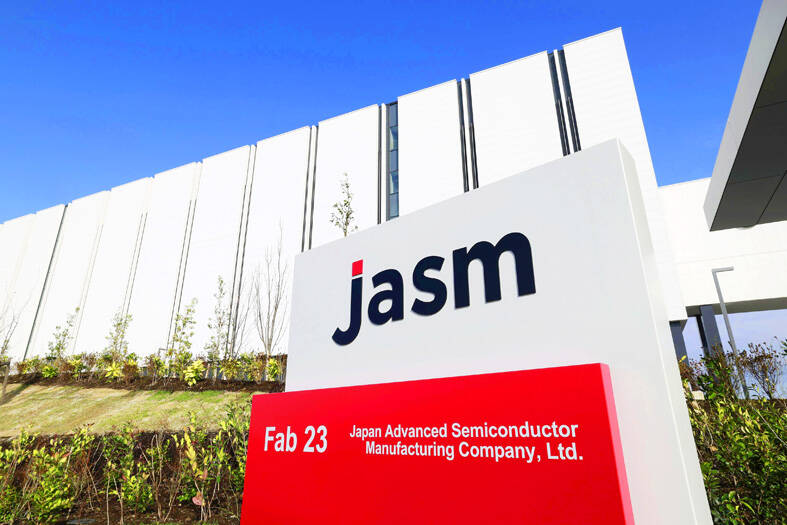Taiwan Semiconductor Manufacturing Co (TSMC, 台積電), the world’s largest contract chipmaker, received NT$47.55 billion (US$1.51 billion) in subsidies from China and Japan last year for investing in those countries, company data showed.
The subsidies were sharply higher than in 2022, when they totaled about NT$7.5 billion, reflecting that many countries covet TSMC’s technology and are eager to attract the firm.
The subsidies last year were handed out to support the expansion or building of new facilities in Nanjing, China, and Kumamoto, Japan. They were also used to finance land and equipment purchases, and to fund day-to-day operations.

Photo: Kyodo News via AP
TSMC opened a plant in Kumamoto on Feb. 24 through its joint venture Japan Advanced Semiconductor Manufacturing (JASM). The firm is planning to build a second fab in Kumamoto, with construction slated to begin at the end of next year and mass production scheduled to begin at the end of 2027.
The firm is to invest more than US$20 billion in the projects in Japan, TSMC said, adding that it has received strong support from the Japanese government.
On Feb. 24, Japanese Minister of Economy, Trade and Industry Ken Saito said that the Japanese government would grant ¥732 billion (US$4.98 billion) to JASM to build the second fab in Kumamoto.
Along with a subsidy of ¥476 billion for the first fab in Kumamoto, the Japanese government’s total grants to TSMC would top ¥1.2 trillion.
Elsewhere, TSMC is investing US$40 billion to build two advanced wafer plants in Arizona.
A report from Bloomberg on Friday cited sources as saying that TSMC is set to secure more than US$5 billion in federal grants to support its investments in Arizona, much lower than the subsidies planned by Japan.
The report said the grants have not been finalized, and it was still unclear whether the Taiwanese chipmaker would tap into the loans and guarantees on offer from the CHIPS and Science Act that US President Joe Biden signed into law in August 2022.
TSMC did not comment on the report.
Several chipmakers, including TSMC, Intel Corp, Samsung Electronics Co and Micron Technology Inc, are in discussions with the US government for about US$28 billion in subsidies for sophisticated facility investments through the CHIPS Act, Bloomberg reported.
US officials were aiming to announce grants to major chipmakers by the end of this month, the report said.
The US government has so far unveiled three grants to companies that roll out older generation semiconductors.
TSMC is also planning to build a wafer fab in Germany. Recent reports said TSMC could receive up to 5 billion euros (US$5.47 billion) in grants from the German government for the new plant, almost half of the total investment.

GROWING OWINGS: While Luxembourg and China swapped the top three spots, the US continued to be the largest exposure for Taiwan for the 41st consecutive quarter The US remained the largest debtor nation to Taiwan’s banking sector for the 41st consecutive quarter at the end of September, after local banks’ exposure to the US market rose more than 2 percent from three months earlier, the central bank said. Exposure to the US increased to US$198.896 billion, up US$4.026 billion, or 2.07 percent, from US$194.87 billion in the previous quarter, data released by the central bank showed on Friday. Of the increase, about US$1.4 billion came from banks’ investments in securitized products and interbank loans in the US, while another US$2.6 billion stemmed from trust assets, including mutual funds,

Micron Memory Taiwan Co (台灣美光), a subsidiary of US memorychip maker Micron Technology Inc, has been granted a NT$4.7 billion (US$149.5 million) subsidy under the Ministry of Economic Affairs A+ Corporate Innovation and R&D Enhancement program, the ministry said yesterday. The US memorychip maker’s program aims to back the development of high-performance and high-bandwidth memory chips with a total budget of NT$11.75 billion, the ministry said. Aside from the government funding, Micron is to inject the remaining investment of NT$7.06 billion as the company applied to participate the government’s Global Innovation Partnership Program to deepen technology cooperation, a ministry official told the

Taiwan Semiconductor Manufacturing Co (TSMC, 台積電), the world’s leading advanced chipmaker, officially began volume production of its 2-nanometer chips in the fourth quarter of this year, according to a recent update on the company’s Web site. The low-key announcement confirms that TSMC, the go-to chipmaker for artificial intelligence (AI) hardware providers Nvidia Corp and iPhone maker Apple Inc, met its original roadmap for the next-generation technology. Production is currently centered at Fab 22 in Kaohsiung, utilizing the company’s first-generation nanosheet transistor technology. The new architecture achieves “full-node strides in performance and power consumption,” TSMC said. The company described the 2nm process as

JOINT EFFORTS: MediaTek would partner with Denso to develop custom chips to support the car-part specialist company’s driver-assist systems in an expanding market MediaTek Inc (聯發科), the world’s largest mobile phone chip designer, yesterday said it is working closely with Japan’s Denso Corp to build a custom automotive system-on-chip (SoC) solution tailored for advanced driver-assistance systems and cockpit systems, adding another customer to its new application-specific IC (ASIC) business. This effort merges Denso’s automotive-grade safety expertise and deep vehicle integration with MediaTek’s technologies cultivated through the development of Media- Tek’s Dimensity AX, leveraging efficient, high-performance SoCs and artificial intelligence (AI) capabilities to offer a scalable, production-ready platform for next-generation driver assistance, the company said in a statement yesterday. “Through this collaboration, we are bringing two